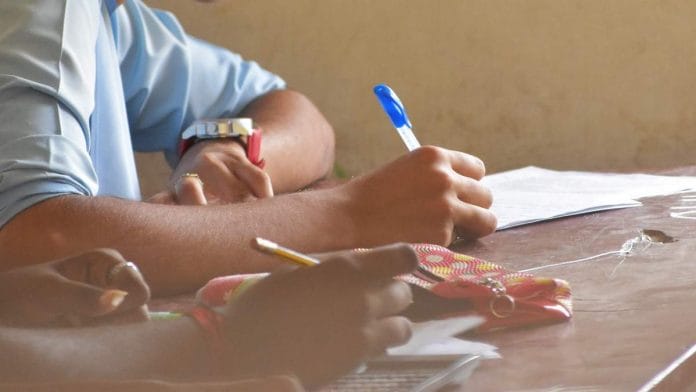New Delhi: The Ministry of Health and Family Welfare (MoHFW) Wednesday announced the standard operating procedures (SOP) to be followed while conducting examinations amid the ongoing Covid-19 pandemic.
The guidelines came just days after the Supreme Court’s 28 August ruling that said states and universities cannot promote students without holding final year examinations by 30 September.
Separate arrangements for containment zones
The ministry has said only centres outside containment zones will be allowed to conduct examinations. Staff and examinees from containment zones will not be allowed at the centres and educational institutions will have to make separate arrangements for them at a later date and via other means.
Only asymptomatic students and staff will be allowed inside an examination centre. Any symptomatic student will be referred to the nearest health centre and the institution shall arrange for arranging the candidate’s exam at a later date, when the person is declared physically fit.
The ministry also said if a student is found to be symptomatic and insists on writing an examination, the candidate may be allowed to do so in a separate isolation room with due permission from the authorities conducting the examination. If the candidate’s symptoms deteriorate, the nearest health facility needs to be informed. The examination premises will also need to be disinfected if a person is found positive.
Staff belonging to high-risk groups such as older employees, pregnant women and those with underlying health conditions will not be deployed at examination centres. In case such deployment can’t be avoided, such people will be given tasks that do not involve direct contact with students.
Also read: Govt job aspirants protest delay in results, issuance of admit cards with a trending hashtag
Social distancing, multiple entry & exit gates
Institutions have been asked to plan examinations in a staggered manner to avoid overcrowding. Adequate workforce also needs to be deployed to ensure social distancing is maintained.
Multiple entry and exits gates have also been recommended to avoid crowding. Students will be taken in batches for registration, and then sent in batches inside the examination rooms.
Exam centres will also need to ensure adequate rooms so that seating arrangements are made with proper social distancing.
Contact-less processes such online forms, digital signatures have been recommended. No sharing of personal belongings will be allowed, use of spit or saliva to separate sheets will also not be allowed.
Without face covers or masks, students will not be allowed entry. Masks are also to be worn at all times.
Also read: Only non-serious aspirants, Modi-baiters want JEE-NEET postponed: ex Kota student






